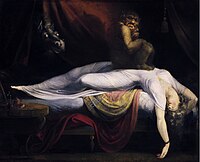
Photo from wikipedia
Focusing on lucid dreaming, this paper examined relationships between dissociated experiences related to rapid eye movement (REM) sleep (lucid dreaming, nightmares, and sleep paralysis), reality testing, and paranormal experiences/beliefs. The… Click to show full abstract
Focusing on lucid dreaming, this paper examined relationships between dissociated experiences related to rapid eye movement (REM) sleep (lucid dreaming, nightmares, and sleep paralysis), reality testing, and paranormal experiences/beliefs. The study comprised a UK-based online sample of 455 respondents (110 males, 345 females, Mean age = 34.46 years, SD = 15.70), who had all previously experienced lucid dreaming. Respondents completed established self-report measures assessing control within lucid dreaming, experience and frequency of nightmares, incidence of sleep paralysis, proneness to reality testing deficits (Inventory of Personality Organization subscale, IPO-RT), subjective experience of receptive psi and life after death (paranormal experience), and paranormal belief. Analysis comprised tests of correlational and predictive relationships between sleep-related outcomes, IPO-RT scores, and paranormal measures. Significant positive correlations between sleep and paranormal measures were weak. Paranormal measures related differentially to sleep indices. Paranormal experience correlated with lucid dreaming, nightmares, and sleep paralysis, whereas paranormal belief related only to nightmares and sleep paralysis. IPO-RT correlated positively with all paranormal and sleep-related measures. Within the IPO-RT, the Auditory and Visual Hallucinations sub-factor demonstrated the strongest positive associations with sleep measures. Structural equation modeling indicated that Auditory and Visual Hallucinations significantly positively predicted dissociated experiences related to REM sleep, while paranormal experience did not. However, paranormal experience was a significant predictor when analysis controlled for Auditory and Visual Hallucinations. The moderate positive association between these variables explained this effect. Findings indicated that self-generated, productive cognitive-processes (as encompassed by Auditory and Visual Hallucinations) played a significant role in conscious control and awareness of lucid dreaming, and related dissociative sleep states (sleep paralysis and nightmares).
Journal Title: Frontiers in Psychology
Year Published: 2020
Link to full text (if available)
Share on Social Media: Sign Up to like & get
recommendations!